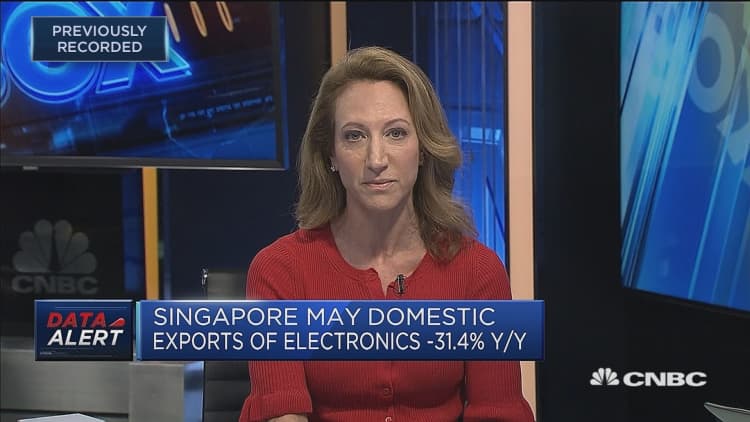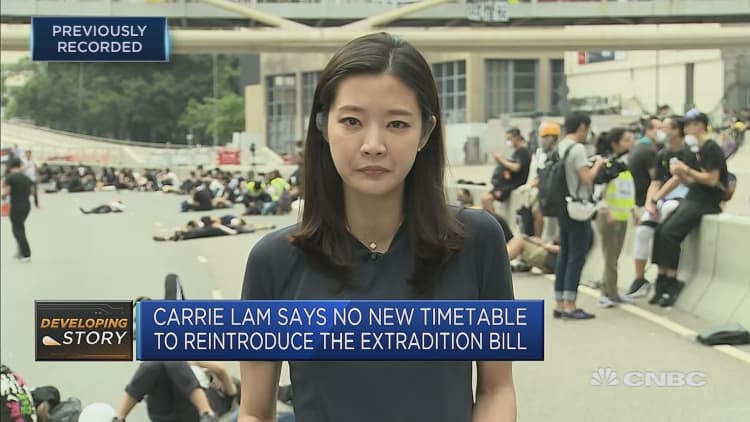
About 2,000 protesters gathered outside the Hong Kong legislature on Monday, demanding to speak directly to the city's top official Carrie Lam, as protests entered a second straight week.
On Sunday, hundreds of thousands thronged the streets in mass protests in an outpouring of anger over a controversial extradition bill that would allow fugitives to be sent from Hong Kong to China for trial. Organizers claimed that some 2 million people participated in those demonstrations, though police offered a far lower figure of at least 338,000.
Pockets of protesters remained on some streets on Monday, but the roads were mostly cleared and traffic returned to normal.
Even though Lam, Hong Kong's Chief Executive, had caved in to pressure and suspended the passage of the bill on the weekend, critics have called for her resignation and are demanding that the legislation be completely withdrawn.
Protesters — appearing to number about 2,000 by CNBC's estimates — sat outside the Legislative Council on Monday afternoon, chanting for Lam to talk to them directly after she issued an apology on Sunday through a spokesperson, which some deemed an insult.
The crowds cheered wildly when Joshua Wong, a pro-democracy student leader of the "Umbrella" protests in 2014, showed up to address demonstrators after his release from prison on Monday. Wong had spent five weeks in jail over contempt of court charges.
'Elephant in the room'
The head of a local U.S. business group called the suspension of the bill a step in the right direction, but added that the whole idea needs to be completely scrapped.
"Of course, we would like to see this bill dropped," Tara Joseph, president of the American Chamber of Commerce in Hong Kong, told CNBC's "Squawk Box" on Monday, stressing that worries won't be erased as long as the possibility of passage remains.

"The main thing is just the notion that people could be extradited to China — that's the elephant in the room, that's what people are overwhelmingly concerned about."
While the bill would allow extraditions to a number of jurisdictions including Taiwan, it is the inclusion of China that has stoked opposition due to worries that the people of Hong Kong may become entangled in the mainland's legal system.
Lam and her deputies have tried to win understanding by limiting the types of crimes for which extraditions could take place and ensuring human rights would not be violated through what they describe as adequate "safeguards."
Apology was an 'insult'
Lam, Hong Kong's top official, announced on Saturday that she will shelve the bill indefinitely, allowing more time for dialogue with its opponents. But demonstrators fear she won't give up and will eventually push for its passage.
"But there are other aspects of it," added Joseph. It's the erosion, or the sense of erosion, of "one country, two systems" that concerns people.
Joseph was referring to the framework under which Hong Kong, a former British colony with its own legal system and civil service, was guaranteed a high degree of control over its own affairs for at least 50 years when Britain ceded control to China on July 1, 1997.
In an attempt to ease public anger, Lam issued the apology via a statement from a government spokesperson on Sunday night as the protests continued.
The spokesperson said that Lam "admitted" that the government had caused "disappointment and grief" to Hong Kong's people. "The chief executive apologized to the people of Hong Kong for this and pledged to adopt a most sincere and humble attitude to accept criticisms and make improvements in serving the public," the statement added.
But it appeared to backfire. The civic group that organized Sunday's demonstration, the Civil Human Rights Front, denounced the apology and said that its delivery through a press release was a "total insult" to protesters.
Pressing need for new bill
As a British colony, Hong Kong used to be included in Britain's extradition arrangements, said Ronald Arculli, a former local legislator. But since 1997, the territory has had to reach its own agreements. It has so far forged only about 20 of them, he said, underscoring a "pressing need" need for the kind of legislation Lam is pursuing.
Still, Arculli told CNBC's "Street Signs" on Monday that the best option now is for a "cooling off period" before the government takes up the issue again. He also called for people to remember the benefits of Hong Kong's overall relationship with China.
"I think even the most severe critics would say that 'one country, two system(s)' by and large has worked extremely well post-97 — and that's 22 years," said Arculli, who was a former chairman of the Hong Kong stock exchange operator. "That's a long time, that's a generation."
— CNBC's Chery Kang, Shirley Tay, Yolande Chee and Vivian Kam contributed to this report


